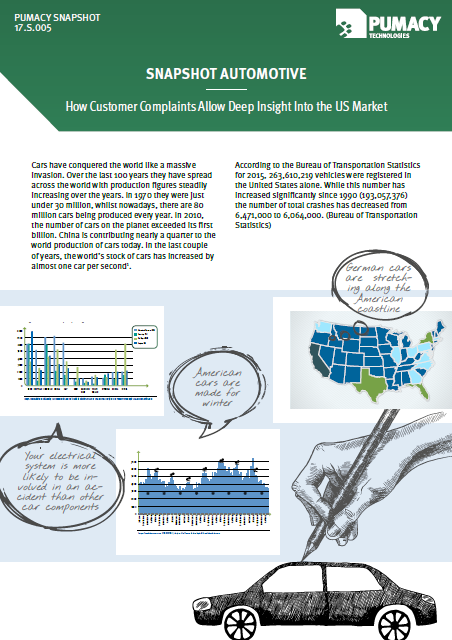Veröffentlicht am: 20.11.2017

Snapshot Automotive
How Customer Complaints Allow Deep Insight Into the US Market
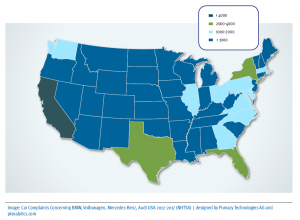 Cars have conquered the world like a massive invasion. Over the last 100 years they have spread across the world with production figures steadily increasing over the years. In 1970 they were just under 30 million, whilst nowadays, there are 80 million cars being produced every year. In 2010, the number of cars on the planet exceeded its first billion. China is contributing nearly a quarter to the world production of cars today. In the last couple of years, the world’s stock of cars has increased by almost one car per second. Formerly comfort and status symbols were far more important than they seem to be nowadays. Instead, security and safekeeping has become extremely relevant for buyers and makers. When buying a car, have a look at the statistics. Electrical systems are not necessarily the reason for an accident, but are very often mentioned in complaints. By optimizing electrical systems and airbags, manufacturers have a high potential to reduce their complaints and more importantly, make their cars safer.
Cars have conquered the world like a massive invasion. Over the last 100 years they have spread across the world with production figures steadily increasing over the years. In 1970 they were just under 30 million, whilst nowadays, there are 80 million cars being produced every year. In 2010, the number of cars on the planet exceeded its first billion. China is contributing nearly a quarter to the world production of cars today. In the last couple of years, the world’s stock of cars has increased by almost one car per second. Formerly comfort and status symbols were far more important than they seem to be nowadays. Instead, security and safekeeping has become extremely relevant for buyers and makers. When buying a car, have a look at the statistics. Electrical systems are not necessarily the reason for an accident, but are very often mentioned in complaints. By optimizing electrical systems and airbags, manufacturers have a high potential to reduce their complaints and more importantly, make their cars safer.
Pumacy Snapshot Automotive for free
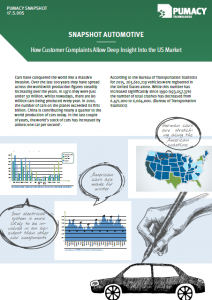 Our latest Snapshot for Automotive shows you how damage reports for companies can be the ideal basis for taking corrective measures at an early stage and minimizing or even completely avoiding future damage. Do you want to read more? Fill out the contact form below to get your free copy.
Our latest Snapshot for Automotive shows you how damage reports for companies can be the ideal basis for taking corrective measures at an early stage and minimizing or even completely avoiding future damage. Do you want to read more? Fill out the contact form below to get your free copy.
Disclaimer
All analytics are supported by Plexalytics and its automotive edition Carwatch. This software is specialized to read and visualize a massive amount of data records: plexalytics.com.
Research Design
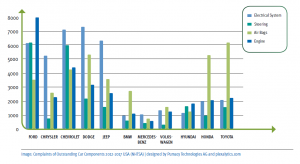 Statistics can only be as good as their data. We based our conclusions on the data of the National Highway Traffic Safety Administration (NHTSA). This is an agency of the Executive Branch of the U.S. government and part of the Department of Transportation: “National Center for Statistics and Analysis (NCSA), an office of the National Highway Traffic Safety Administration, is responsible for providing a wide range of analytical and statistical support to NHTSA and the highway safety community at large.” Their mission is “to save lives, prevent injuries, and reduce conomic costs due to road traffic, crashes, through education, research, safety standards, and enforcement.” Private people as well as insurances or public authorities report accidents online, by phone or mailing system. At the time of our research the database had 382.682 entries which make more than 5.5 million data records. The data is open to public.
Statistics can only be as good as their data. We based our conclusions on the data of the National Highway Traffic Safety Administration (NHTSA). This is an agency of the Executive Branch of the U.S. government and part of the Department of Transportation: “National Center for Statistics and Analysis (NCSA), an office of the National Highway Traffic Safety Administration, is responsible for providing a wide range of analytical and statistical support to NHTSA and the highway safety community at large.” Their mission is “to save lives, prevent injuries, and reduce conomic costs due to road traffic, crashes, through education, research, safety standards, and enforcement.” Private people as well as insurances or public authorities report accidents online, by phone or mailing system. At the time of our research the database had 382.682 entries which make more than 5.5 million data records. The data is open to public.
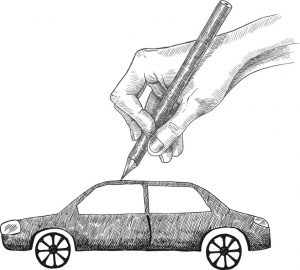 For most charts we worked with the car manufacturers who have the highest number of cars on American streets. Several charts are presenting car makes: we based our calculation of “their” car complaints on absolute not relative data. Which means that when Ford has a high amount of accidents this is because they have lots of cars on American streets. Relatively they might not lead the statistic. Apart from the National Highway Traffic Safety Administration we worked with data from the Bureau of Transportation Statistics and Federal Highway Administration (FHWA), for profit companies such as IHS and Hedges & Company and Websites such as live-counter.com/autos).
For most charts we worked with the car manufacturers who have the highest number of cars on American streets. Several charts are presenting car makes: we based our calculation of “their” car complaints on absolute not relative data. Which means that when Ford has a high amount of accidents this is because they have lots of cars on American streets. Relatively they might not lead the statistic. Apart from the National Highway Traffic Safety Administration we worked with data from the Bureau of Transportation Statistics and Federal Highway Administration (FHWA), for profit companies such as IHS and Hedges & Company and Websites such as live-counter.com/autos).
Further Information
 Plexalytics for Car Warranty Management enables the analysis of internal quality assurance data and external information about error cases in the automotive sector.The platform adresses automotive OEM’s and suppliers and provides an intelligent 360° view of quality relevant data and product related feedback regarding failures, problems, deficiencies or damages.
Plexalytics for Car Warranty Management enables the analysis of internal quality assurance data and external information about error cases in the automotive sector.The platform adresses automotive OEM’s and suppliers and provides an intelligent 360° view of quality relevant data and product related feedback regarding failures, problems, deficiencies or damages.
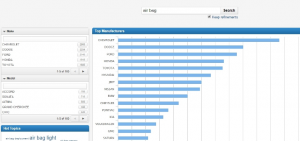 Press Release (October 2017): With the new platform “Plexalytics”, Pumacy brings its big data industry applications to the Internet and enables complex data analysis online. In the next few months, the Carwatch application will be expanded. Additional customers are to migrate into the platform environment. In addition, numerous additional functions are enabled, such as predictive Weibull distributions, which enable predictive analysis of damage cases.
Press Release (October 2017): With the new platform “Plexalytics”, Pumacy brings its big data industry applications to the Internet and enables complex data analysis online. In the next few months, the Carwatch application will be expanded. Additional customers are to migrate into the platform environment. In addition, numerous additional functions are enabled, such as predictive Weibull distributions, which enable predictive analysis of damage cases.

